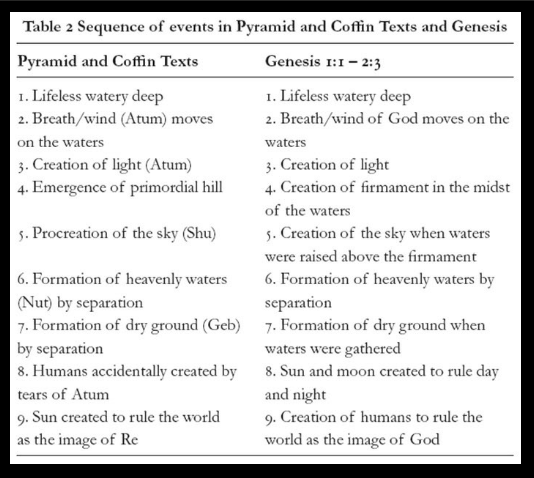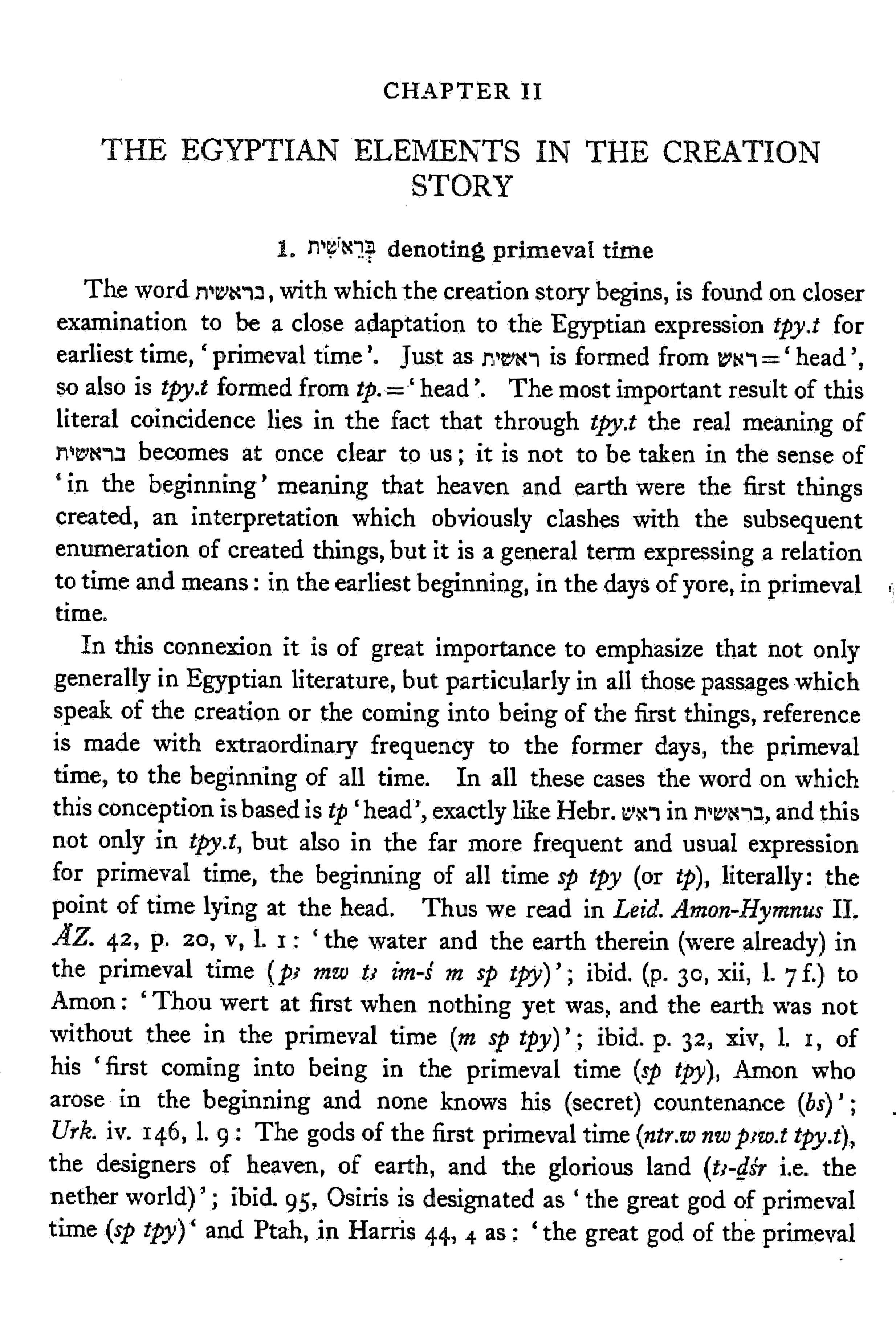Last time we began to look at the opening of Genesis chapter 1. We learned that the elements which I believe came from nothing (ex nihilo), were the building blocks for the Lords big project of creation. These building blocks of matter are mentioned in many myths and legends from Egypt to Babylon. However the Genesis account is a complete contrast to all of these other myths. Moses wrote in such a way that his account is completely different. A lot of scholars following Julius Wellhousen put the ideas from the Babylonia and near vicinites.

I completely disagree. Israel ended up in a captivity twice. Once as a family and then as a nation; Egypt and Babylon. Genesis was written in the first phase and looks back to when Abraham was even in Egypt. At this early juncture according to the text a lot of the events took place in Egypt. It does not make sense to have to look to Babylonia for evidence of the Genesis flood. In fact there are linguistic and archaeological evidence that the Genesis account of creation was written from a contrasting Egyptian background.
Have a look at the following details which I got from Steinmann, Andrew E.. Genesis . IVP. Kindle Edition:
In some ways the Genesis account lined up with the Egyptian account may look the same but in fact the interpretation is completely different. It is the One God, the creator of heaven and earth who made life on earth. In the Genesis account there are no extra gods. In the above list I think that Steinman is wrong to suggest that it was the ‘wind of God.’ No it was the Spirit of God who hovered over the formless and void waters of the deep. God did not touch this unformed mass of matter, He hovered over the surface of the deep. There was no light in the void was as it was completely dark and no day. the void was neither good nor evil, it was just there ready for the Potter to make something wonderful. It was the raw material by which God would create our world and the planets, stars and the world.
The above is just a basic idea of the thought processes of the Ancient Egyptians and how they saw the creation of the world. However there are scholars who have looked at the hieroglyphics contemporary of Moses and more evidence comes up. One thing I didn’t realize was that even the ancient Egyptian language has similarities to Hebrew. Hebrew follows a pattern; verb first, then the subject, then the object, and then everything else. Middle Egyptian also follows that type of pattern and there is even a shared word stock between the two languages. We must remember that the Israelite’s became prisoners and slaves for over 400 years before the Exodus. That is plenty of time for languages to begin to share words and ideas. Even with my background of Turkish Cypriot. Greece was under Ottoman Turkish rule for hundreds of years. Even with this later example there are many words that are shared between the two cultures yet the Greeks did not abandon their religion. In the same way even though Israel was in captivity for hundreds of years they kept their religion.
Concerning the linguistic side of things I found some information that to my mind shows the suppression of evidence that gives an Egyptian background to Genesis 1 rather than Mesopotamian. Tony L Shetter made me aware of A.S. Yahuda who wrote a book as early as 1933 showing clear lings between Genesis 1 and the creation myth stories. (From bible.org/article/genesis-1-2-light-ancient-egyptian-creation-myths) To follow the link one needs to write https at the front of the web address.
Asa taster to what Jahua was saying the following is an excerpt from his book:

(The text above was taken from ‘The Language of the Pentateuch in its relation to Egyptian’; by A S Yahuda; OUP 1933)
As I said this was just a taster to Jahuda’s scholarship as he delves into these backgrounds. Suffice to say it begs to ask the question, why scholars such as Walter Brueggemann take the Mesoptamian road for Genesis creation background. At least at a minimum one should consider the Egyptian evidences for a background to the Genesis account. Hmm maybe this status quo is now starting to break down
Tony L shetter said:
“The involvement of Amun in the creation tradition at Hermopolis appears to parallel the role of <yh!l)a$ j^Wr ‘mighty wind’ or ‘wind of God’65 in Genesis 1:2.66 At the beginning of creation, the j^Wr hovers over the waters. One could imagine a mighty wind blowing upon the primordial waters stirring them into motion. Thus, the parallels between the Ogdoad of Hermopolis and the conditions present at the beginning of creation in Genesis 1:2 reveal that the Hebrews and the Egyptians shared a similar concept of the primordial state. However, one stark contrast exists. While the Egyptians personified the elements of nature, the Hebrews saw their God as distinct from the creation. The elements of the primordial universe await the command of the Creator rather than acting with independent volition. Furthermore, Atum-Re (creator-god and sun-god respectively) evolved/created himself out of the pre-existent water. By Contrast, Yahweh is eternally pre-existent, is distinct from the primeval water, and did not create himself.”
There was therefore shared ideas between Genesis 1 and egyptian mythology but one big difference;
” However, one stark contrast exists. While the Egyptians personified the elements of nature, the Hebrews saw their God as distinct from the creation.”
This is the great break with the past and mythology. God is separate from his creation even from the primeval waters but there does exist a relation. How amazing that Moses wrote that the Spirit of God hovered over the surface of the deep but God did not touch the primeval waters. It goes on in the text that God spoke and things happened.
In the ancient world the God of the Bible was revolutionary stuff and it is no surprise that Israel survived but one does not hear much of the other cultures that existed at that time. Herman Bavinck in his doctrine of creation gives us some wonderful descriptions of God and His creation:
“From the very first moment, true religion distinguishes itself from all other religions by the fact that it construes the relation between God and the world, including man, as that between the Creator and his creature. The idea of an existence apart from and independent of God occurs nowhere in Scripture.
God is the sole, unique, and absolute cause of all that exists.
He has created all things by his word and Spirit (Gen. 1:2—3; Ps. 33:6; 104z29—30; 1485; Job 26:13; 33:4; Isa. 40:13; 48:13; Zech. 12:1;] john 1:3; Col. 1:16; Heb. 1:2; etc.). There was no substance or principle of any kind to oppose him; no material to tie him down; no force to circumscribe his freedom.
He speaks and things spring into being (Gen. 1:3; Ps. 33:9; Rom. 4:17). He is the unrestricted owner of heaven and earth (Gen. 14:19, 22; Ps. 24: 1—2; 89:1 1; 95:4—5).
There are no limits to his power; he does all he sees fit to do (Isa. 14:24, 27; 46:10; 55:10—11; Ps. 115z3; 135z6). “From him and through him and to him are all things” (Rom. 11:36; 1 Cor. 8:6; Heb. 11:3).
The world is the product of his will (PS. 33:6; Rev. 4:11); it is the revelation of his perfections (Prov. 8:22f.; Job 28:23f.; Ps. 104:1; 136:5f.; Jet. 10:12) and finds its goal in his glory (Isa. 43:16ff.; Prov. 16:4; Rom. 11:36; 1 Cor. 8:6).”
( From Reformed Dogmatics; God and Creation; Volume 2; chapter 8; page 407; Herman Bavinck; Translated by John Vriend; Edited by John Bolt; Baker Academic)
For Christian theology then, God created the univese from nothing even as a few pages later Bavinck actually goes into ex nihillo. As we have already said this goes into deep contrast with the Egyptian and Mesapotamian myths. God is infinite and the material universe is finite yet there is a realtionship. This relationship is not dualistic. The material universe is finite and its very existence depends on God. In Genesis chapter 1 verses1-5 all of the main verbs that relate to God’s actions are perfect in meaning.
- Verses 1&2; The one infinite God builds the building blocks of the universe from nothing
- Verse 3; Upto there there is no light but God speaks and light comes into being for the first time.
- Verse 4; In many mythologies the universe is seen as evil. God says the opposite that ‘it was good’
- Verse 5; God called the light day and the darkness night
Reflection
God is in control of the universe and not the other way around. First of all we need to remember that Genesis is about the basic foundational principles that the whole Bible is built upon. Bavinck shows us that the Genesis account of Creation runs through the whole of Scripture and even at the end in Revelations the Tree of Life is there. We are blessed and it is an encouragement for us to look upto heaven knowing that our Trintarian God planned evertything ahead, and one day at Jesus second coming, we will meet him. This wonderful story up to verse 5 is written with verbs that are perfect in meaning. A perfect verb for a perfect story, everything complete.
Leave a comment